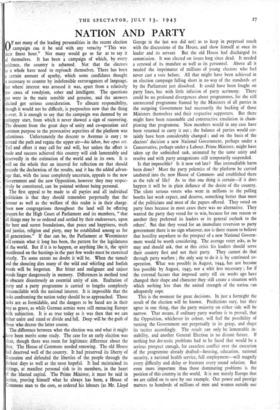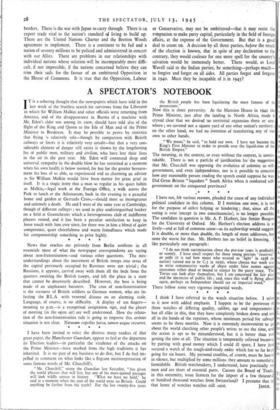NATION AND PARTY
OF not many of the leading personalities in the recent election campaign can it be said with any veracity " This was their finest hour." Not many would go so far as to say it of themselves. It has been a campaign of which, by every evidence, the country is ashamed. Not that the electors as a whole have 'need to repioach themselves. There has been a certain amount of apathy, which some candidates thought it necessary to counter by indefensible extravagances of language, but where interest was aroused it was, apart from a relatively few cases of rowdyism, sober and intelligent. The questions put were in the main sensible and genuine, and the answers elicited got serious consideration. To allocate responsibility, though it would not be difficult, is purposeless now that the thing is over. It is enough to say that the campaign was damned by an unhappy start, from which it never showed a sign of recovering. The descent from the great days of unity and co-operation and common purpose to the provocative asperities of the platform was calamitous. Unfortunately the descent to Avernus is easy ; to retread the path and regain the upper air—hic labor, hoc opus est. Toil and effort it may call for and will, but unless the effort is made and success achieved this country will sink lamentably and deservedly in the estimation of the world and in its own. It is well on the whole that an interval for reflection on that should precede the declaration of the results, and it has the added advan- tage that, with the issue completely uncertain, appeals to the new Government and the new Opposition, however they may respec- tively be constituted, can be pointed without being personal.
The first appeal to be made to all parties and all individual politicians is that they should remember perpetually that the honour as well as the welfare of this realm is in their charge. Soon now congregations throughout the land will be offering prayerS for the High Court of Parliament and its members, " that all things may be so ordered and settled by their endeavours, upon the best and surest foundations, that peace and happiness, truth and justice, religion and piety, may be established among us for all generations." If that can be, the Parliament at Westminster will remain what it long has been, the pattern for the legislatures of the world. But if it is to happen, or anything like it, the spirit manifested on the hustings in the past few weeks must be exorcised utterly. To some extent no doubt it 'will be. When the tumult and the shouting dies many of the wild and whirling and foolish words will be forgotten. But bitter and malignant and unjust words linger dangerously in memory. Differences in method tend to obscure disastrously an essential unity of aim. Exaltation of party and a party programme is carried to lengths completely irreconcilable with the national interest. It is impossible that the tasks confronting the nation today should be so approached. Those tasks are as formidable, and the dangers to be faced are in their way as grave, as while German armies were still menacing Europe with subjection. It is as true today as it was then that we can either unite and stand or divide and fall. Deep will be the guilt of those who decree the latter course.
The difference between what the election was and what it might have been merits some study. The case for an early election was clear, though there was room for legitimate difference about the date. The House of Commons needed renewing. The old House had deserved well of the country. It had preserved its liberty of discussion and defended the liberties of the people through the darkest days as well as the most hopefuL It had maintained its sittings, at manifest personal risk to its members, in the heart of the blasted capital. The Prime Minister, it must be said in Justice, proving himself what he always has been, a House of Commons man to the core, so ordered his labours (as Mr. Lloyd George in the last war did not) as to keep in perpetual touch with the discussions of the House, and show himself at once its leader and its servant But the old House had discharged its commission. It was elected on issues long since dead. It needed a renewal of its mandate as well as its personnel. Above all it needed the imprimatur of millions of young electors who had never cast a vote before. All that might have been achieved in an election campaign falling short in no way of the standards set by the Parliament just dissolved. It could have been fought on party lines, but with little infusion of party acrimony. There could be no profound divergences about programmes, for the still unexecuted programme framed by the Ministers of all parties in the outgoing Government had necessarily the backing of those Ministers themselves and their respective supporters. But there might have been reasonable ;Ind constructive emulation in cham- pioning that programme. New members would in any case have been returned to carry it out ; the balance of parties would cer- tainly have been considerably changed ; and on the basis of the electors' decision a new National Government, perhaps under a Conservative, perhaps under a Labour, Prime Minister, might have taken up the unfinished task, animated by the same unity and resolve and with party antagonisms still temporarily suspended.
Is that impossible? Is it now to late? Has irremediable harm been done? Must the party polemics of the platform be carried unabated into the new House of Commons and established there as the rule of life? As to that one thing is certain—if it does happen it will be in plain defiance of the desire of the country. The silent serious voters who went in millions to the polling booths last week expect, and deserve, something better than most of the politicians and most of the papers offered. They voted on party lines because in most cases there was no alternative. They wanted the party they voted for to win, because for one reason or another they preferred its leaders or its general outlook to the others'. But that they voted for an immediate reversion to party government there is no sign whatever, nor is there reason to believe that hostility anywhere to the prospect of a new National Govern- ment would be worth considering. The average voter asks, as he may and should ask, that at this crisis his leaders should serve their country first and not their party. They cannot do that through party warfare ; the only way to do it is by continued co- operation. What was possible in. August, 1944, has not become less possible by August, 1945, nor a whit less necessary ; for if the external factors that imposed unity till six weeks ago have changed their shape and character they still create a situation with which nothing less than the united strength of the nation can adequately cope.
This is the moment for great decisions. In just a fortnight the result of the election will be known. Predictions vary, but they agree in one thing, that the party majority on either side will be narrow. That means, if ordinary party warfare is to prevail, that the Opposition, whichever its colour, will feel the possibility of turning the Government out perpetually in its grasp, and shape its tactics accordingly. The result can only be lamentable in- stability, and another General Election in no distant future. If nothing but domestic problems had to be faced that would be a serious prospect enough, for ceaseless conflict over the execution of the programme already drafted—housing, education, national security, a national health service, full employment—will magnify every difficulty and delay or frustrate every sound solution. But even more important than those dominating problems is the position of this country in the world, It is not merely Europe that we are called on to save by our example. Our power and prestige matters to hundreds of millions of men and women outside our borders. There is the war with Japan to carry through. There is an export trade vital to the nation's standard of living to build up. There are the United Nations Charter and the Bretton Woods agreement to implement. There is a continent to be fed and a nation of seventy millions to be policed and administered in concert with our Allies. There are problems in our relationships with individual nations whose solution will be incomparably more diffi- cult, if not impossible, if the nations concerned believe they can trim their sails for the favour of an embittered Opposition in the House of Commons. It is true that the Opposition, Labour or Conservative, may not be embittered—that it may resist the temptation to make party capital, particularly in the field of foreign affairs, at the expense of the Government. But that is a good deal to count on. A decision by all three parties, before the result of the election is known, that in spite of any declaration to the contrary, they would coalesce for one more spell for the country's salvation would be immensely better. There would, as Lord Wavell said to the Indian parties, be something—perhaps much—. to forgive and forget on all sides. All parties forgot and forgave in 1940. Must they be incapable of it in 1945?



























 Previous page
Previous page